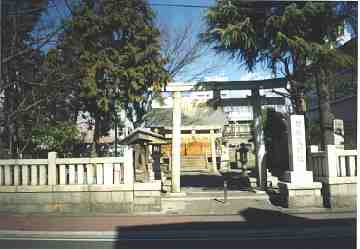The Salad Bowl.
Vol. V, No. 7. August 1997.
(Historic Sites in Shimizu)
Murayashiro Koujin Shrine
 One way to sense of the pulse of a neighborhood is to visit its landmarks. Meandering around
Shimizu JR Station toward the Shizu-tetsu Shin-Shimizu station, you might come across a
patch of green surrounded by a mosaic of rusty brown and amber buildings in the area around
Higashi Ejiri. About fifty meters west of Route 149 and a hundred meters east of the
Tomoe River, Murayashiro Koujin Shrine is off the beaten path, yet close to downtown
Shimizu.
One way to sense of the pulse of a neighborhood is to visit its landmarks. Meandering around
Shimizu JR Station toward the Shizu-tetsu Shin-Shimizu station, you might come across a
patch of green surrounded by a mosaic of rusty brown and amber buildings in the area around
Higashi Ejiri. About fifty meters west of Route 149 and a hundred meters east of the
Tomoe River, Murayashiro Koujin Shrine is off the beaten path, yet close to downtown
Shimizu.
No one knows when this shrine was built. One account places its construction at 1709, when the abbot of a local
Nichiren temple decided to build a structure to honor O-koujin-san. During the period, many Shinto shrines were
administered by Buddhist priests and even today many Nichiren devotees honor the gods of this shrine.
Another account suggests Takeda Shingen visited this shrine around 1540.
Records show he did made a pilgrimage to a shrine in this area renown for its a large camphor tree.
A mythical account suggests this shrine was built over 2600 years ago. Whether or not there is any historical substance
to this claim, Shinto arches celebrating this shrine's "26th century" stand near the entrance.
The main deity of this shrine is O-koujin san, who is sometimes called Aragami.
O-koujin san has both male and female aspects which are known respectively as
Okutsu-hiko and Okutsu-hime. Today O-koujin
san is regarded primarily as a god of the kitchen and protector from fires.
According to one legend, long ago a fire raged through Shimizu and people came here to pray for safety. Suddenly a
heavy rain fell and the raging fire was extinguished. For a long time after that, the shrine was revered for its
celestial fire insurance.
History is not as kind as legend. On Nov. 4, 1854 a major earthquake hit Shizuoka and a subsequent fire swept through
populated areas such as Ejiri. This shrine, like many buildings, was burnt to the ground. This shrine was subsequently
rebuilt on a smaller scale.
Unfortunately, this shrine didn't escape the U.S. bombings which devastated much of Shizuoka in 1945. Today all of
the pre-war structures within this shrine are badly cracked or effaced. Close to the site where allied bombs once landed
is a memorial marker with the inscription -

Murayashiro Koujin Shrine now rests quietly next to a fish shop and local community
hall. Within the shrine precincts is some gym equipment for children, an empty gateball court, and enough space for one
car to park. Each day a few elderly people pay their respects at this shrine and stray cats and dogs drink from the
roofless ritual ablution basin. The shrine is not quite forgotten, but largely ignored except when its annual festival
is held on May 27th. At that time a small portable shrine is paraded around while fast food and knick-knacks are sold.
-Tim Newfields

www.tnewfields.info/sb/mura.htm
copyright 1997 by Tim Newfields and the Shimizu City International Association
 One way to sense of the pulse of a neighborhood is to visit its landmarks. Meandering around
Shimizu JR Station toward the Shizu-tetsu Shin-Shimizu station, you might come across a
patch of green surrounded by a mosaic of rusty brown and amber buildings in the area around
Higashi Ejiri. About fifty meters west of Route 149 and a hundred meters east of the
Tomoe River, Murayashiro Koujin Shrine is off the beaten path, yet close to downtown
Shimizu.
One way to sense of the pulse of a neighborhood is to visit its landmarks. Meandering around
Shimizu JR Station toward the Shizu-tetsu Shin-Shimizu station, you might come across a
patch of green surrounded by a mosaic of rusty brown and amber buildings in the area around
Higashi Ejiri. About fifty meters west of Route 149 and a hundred meters east of the
Tomoe River, Murayashiro Koujin Shrine is off the beaten path, yet close to downtown
Shimizu.